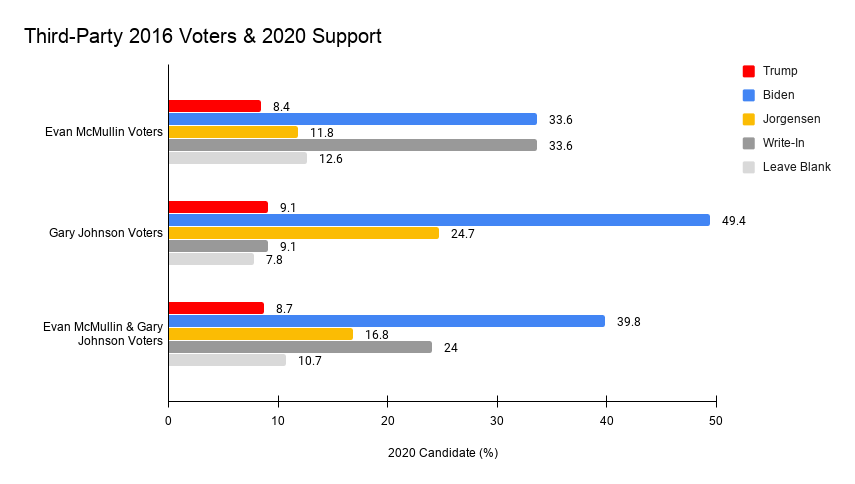To be a lifelong conservative unable to hop aboard the Trump Train is to be one of the loneliest people in politics. Sure, NeverTrump Republicans continue to punch above their weight class on newspaper mastheads and cable TV. But, chided by Trump and his supporters as “human scum” on the right and discarded when no longer politically expedient on the left, many anti-Trump conservatives have spent the past four years adrift, navigating through both increasingly awkward interpersonal relationships and a reassessment of their own beliefs.
“My policy views haven’t changed in decades,” said Mike Bates, an Illinois man who once served as a township chairman of Citizens for Reagan and wrote 20 years worth of weekly conservative columns for the local newspaper. “But I’ve lost a number of friends over Trump. … Now I’m a RINO. Or a Marxist. Or nuts. Or some combo.”
“I grew up listening to Rush Limbaugh in the car with my dad. We owned a lot of God Bless America paraphernalia,” wrote Shane Benjamson of Washington state. He said Trump’s election “blew up” the assumed connection in his head between his pro-life Christian beliefs and the Republican party. “I have spent the last four years re-evaluating my own relationship between my faith and politics. Disentangling the two, I guess you would say. Better late than never. Much of my family cannot disentangle them. They are married together.”
I’ve spent the past several weeks emailing with more than 300 conservatives who—like Mike and Shane—voted in 2016 for either Gary Johnson, the Libertarian party’s nominee, or Evan McMullin, the former CIA officer and House Republican staffer who mounted an independent bid for the White House. These Americans live everywhere from Alabama to Massachusetts, Texas to California; they’re lawyers, military members, insurance agents, and schoolteachers; their ages range from mid-20s to 83. But they are united in their belief that, four years ago, both Donald Trump and Hillary Clinton were unfit for the presidency.
“I’m proud to be able to tell my children that I didn’t vote for Trump or Clinton,” said David, a McMullin voter in Utah. “People would likely try to tell me that by not voting for one, I was voting for the other or that I was throwing away my vote. I don’t buy that reasoning. I’d vote the same way again.”
“I wasn’t going to vote for Hillary because I didn’t believe in anything she was running for,” wrote Jimbob Brown, an audio engineer in Texas. “And I didn’t want to vote for Trump because I believed at the time he had no morals or character, which I still believe.”
Mindy, a voter from Virginia came to the conclusion that she wanted to vote for someone, not against. Enter Evan McMullin. “I felt good about voting my conscience then,” she said. “And when Trump goes off the rails now, I can sleep at night knowing I didn’t participate in putting him there.”
Four years later, these voters are faced with another decision. Joe Biden has replaced Hillary Clinton, and is running on arguably an even more progressive platform. The Libertarian party swapped out Gary Johnson for Jo Jorgensen, a businesswoman and academic who has never held elected office. There’s no white knight on the way to serve as a place for these conservatives to park their votes: McMullin himself endorsed Joe Biden in August. (Rob, a college professor in Maryland lamented that McMullin has since 2016 “turned into the worst kind of anti-Trumper, essentially becoming a liberal simply to be in opposition to Trump.”)
Donald Trump is the only major-party candidate running on a pro-life platform.
But in an informal survey of Dispatch readers who supported McMullin or Johnson in 2016, very few are planning on or leaning toward voting to re-elect the president. In fact, of approximately 200 respondents who had a relatively clear idea of their November intentions, Trump trailed not only Biden, but Jorgensen, write-in candidates, and leaving the presidential line on the ballot blank.

These results are unscientific, and the survey’s methodology introduced plenty of selection bias: Respondents are not only members of The Dispatch, but read The Morning Dispatch newsletter. They opted in to the study, and proactively emailed me their preferences. (It’s worth noting, too, that they represent a very small slice of Dispatch members overall. That broader group includes a wide range of 2020 voters, from enthusiastic Trump supporters to eager Biden backers—and everything in between.)
The data may have their limitations, but coupled with the hundreds of qualitative responses I sifted through, a relatively straightforward narrative emerged. These voters are opposed to Trump almost entirely on character grounds; they appreciate the conservative policy triumphs of the past four years, but no amount of these “wins” can persuade them to join the president’s team.
Nick—a software engineer from North Carolina—rattled off a litany of what he considers successes from the last four years: Judicial nominees, criminal justice reform, the Middle East peace deals, defending the 2nd Amendment, moving the U.S. Embassy in Israel to Jerusalem, remaining steadfast to the pro-life cause. None of it matters to his vote; he’s planning to write someone in. “Trump’s narcissism and ego have been just as toxic as I thought,” he lamented. “His inability to have anyone working for him who doesn’t suck up to him is crippling.”
Rebekah, a homeschooling mom, is deciding between Biden and a write-in candidate. “The way [Trump] responded to the white supremacists in Charlottesville was appalling. His apparent inability to think about anything other than himself is despicable. His response to the pandemic makes him morally culpable for many deaths. No part of me thinks President Trump has any desire to put the country—or anything else—before himself and his image and his need to be loved,” she wrote. “To vote for or support this man because he has done a few good things along the way is (in my view) wrong-headed utilitarianism.”
Sean, a network administrator in Roanoke, Virginia, expressed relief that Trump hasn’t reverted to his pre-Republican ways. “Many conservatives like myself thought that someone as ungrounded ideologically as Trump would end up shifting to liberal positions whenever he thought it would be politically convenient. That hasn’t generally been true,” he said. But Sean would still rather vote for “a genetically engineered semi-sentient crossbreed of poison ivy and salmonella” than the president. “[Trump is] vindictive, cruel, and undisciplined,” he continued. “On any particular issue, when there’s a smart, well-supported conservative argument for it, he still manages to find the dumbest, most racist-sounding, or ignorant version of that argument to put forward.”
Charlie, a retired schoolteacher, reported being “very happy” with Trump’s record on Israel, judges, and the pre-COVID economy. “He deserves credit for those things,” he said. But “[Trump] has been a disaster. He’s turned the party into a personality cult and he’s poisoned the nation. Everyone’s gone mad, either for him or against him. He’s all people talk about. Some policies have been fine, some have been awful, but his approach to governing has caused pain to this nation that will take years to recover from. I will never vote for him.”
For some voters, this deprioritization of candidates’ platforms represented a noticeable shift in their voting strategy. “Prior to Trump,” said Adam, an operations manager at an Amazon facility in Minnesota, “I tended to believe holding the right policy positions were more important than having good character. My opinion on that has been entirely flipped on its head in the last four years.”
“I usually don’t let personality enter into voting decisions,” Ken Simon, a retired attorney in Michigan wrote. “Trump’s lack of honor goes beyond personality.”
There were, of course, exceptions to this rule. Greg, a retired Navy and airline pilot in California who voted for McMullin, wrote that while “the character flaws are still there” with Trump, he is going to vote for his re-election “based on his record.”
“Continuing that progress is what I’m voting for,” he concluded. “Not the man.”
Another airline and retired Air Force pilot, Jeff, is also planning to vote for the incumbent because the “Democrats really blew it” by nominating Joe Biden, who he argued comes with all the same baggage Trump does. “They have very similar defects. So, if you’re not giving me a reasonable choice, I might as well vote for the idiot I know rather than the idiot I don’t know,” he emailed. “So that’s a lot of words to say that I guess I’m voting for, for. Agh, God. I can’t even bring myself to type it.”
But many respondents who voted third party in 2016 don’t view Joe Biden with the same disdain they did Hillary Clinton. “I had grave concerns about Hillary’s character, similar to Trump,” wrote Alex Connor, an Ohio resident. “Biden, on the other hand, I think is a good-hearted man. His age and health are a worry, but if he has his faculties I think he will do what he thinks is best for the country, even if I sometimes disagree with what that is.”
Greg Forster, an evangelical seminary educator in Wisconsin, is voting for Biden in 2020 after McMullin in 2016 because the former vice president is “bad, but bad within normal parameters.” Chris, a lawyer in Texas, is planning to vote for the former vice president if the Lone Star State is polling close come November. “Losing Texas would hopefully be the wakeup call the GOP needs,” he said. Otherwise, “I’ll keep my hands clean and write in Sen. Mitt Romney.”
Biden will be the first Democrat whom Linda Beggs—an educational and business consultant in Georgia—has voted for since the mid-1980s. She was at one point the president of her county’s Republican Women group, and co-chaired Women for Newt [Gingrich] in the 1990s. “I’m not excited about Biden. He’s flirting with leftists and on a mental decline,” she said. “Nevertheless, Trump—and Trumpism—is a cancer to the body politic which must go. Will it go away if Biden is elected? I doubt it. But I know it won’t if Trump wins. Almost everything is secondary to firing him.”
Biden may pick up some NeverTrump, NeverHillary voters, but his selection of Kamala Harris as his running mate likely cost him from securing even more. Robert Wert, an Illinois voter, said he could have voted for a Biden/Amy Klobuchar ticket. “Harris makes my skin crawl and given the likelihood of Biden losing it at some point over the next four years I can’t do it.”
McMullin voters were, on the whole, less likely than their Johnson counterparts to commit to the Democratic nominee and more likely to indicate they will write in a candidate. Many cited Biden’s pro-choice stance as their rationale. “Of course, I cannot in good conscience vote for Mr. Biden/Ms. Harris,” wrote Louisiana McMullin voter Bill Brockman. “Their party’s platform stakes out positions that conflict with Catholic teachings on several substantial moral imperatives.”
That being said, I wondered if four years in the political wilderness—at times coalitioning with Democrats in opposition to Trump—had untethered these conservatives from some of their long held Republican orthodoxies. For many, the answer was a resounding yes. “I’m much more open to social safety net policies and ideas, much less restrictionist on immigration, and less inclined to see things through a partisan lens,” said Texan Kevin Starbuck. “All of those shifts are probably at least partially a result of Trump’s (to me) revolting rhetoric.”
Now that she is “hearing opinions outside of [her] former Fox/talk radio bubble,” Susan Christensen, a retiree from Tennessee, said her views on climate change have shifted. “I stopped listening [to Fox News and talk radio] five years ago when it became obvious that they were becoming shameless Trump shills.”
Ryan, from Nebraska, said he was a “Dittohead” in the 1990s. “The Clintons were the perfect villains for a college conservative. I was a talk radio and Fox News junkie during the W years. [Osama] bin Laden and [Nancy] Pelosi were perfect villains for a true patriot,” he wrote. “The ascension and election of Trump have forced me to re-evaluate what it really means to be a conservative.”
“Owning the libs” doesn’t bring Joseph, a graduate student in Nebraska, the same satisfaction as it once did. “The last four years, and especially Trump’s behavior, have really burnt me out on the value of doing or saying something merely because it enrages the other side,” he said. He added that George Floyd’s death “flipped a switch” for him and his view on racial issues. “I used to have the doctrinaire right-wing view that racism was a thing of the past, barring the odd kook here and there. I now believe that racism is still very much present and significant in our society, and that change is necessary to fulfill the promise of the American idea.”
Amy, a mom from Lancaster, Pennsylvania, who likely won’t vote this year, wrote that she has “become more compassionate regarding issues of social justice” since Trump was elected in 2016. “The president’s crude speech has turned me off at nearly every turn,” she said. “I have found myself thinking more openly regarding the opposing perspective on many issues. Hearing some of my own conservative ideas put forth by Donald Trump with such hate and low-level discourse have made me cringe at some of my own former beliefs.”
A retired professor in North Carolina summed up the phenomenon succinctly. “I agree with [Trump] about a great many things and regret that he has discredited those views by holding them.”
A lot of these voters are already looking toward a post-Trump future. John in North Carolina laid out what he sees as the “ideal scenario,” where Biden takes the presidency and Republicans hold the Senate, “forcing us (I hope) towards compromise and calm.” Jan Douglas in Colorado said she is “hoping if Biden wins maybe the GOP will have some decent candidates in 2024.”
But there’s an election to get through between now and then. And although these conservative third-party voters are a relatively small group—Johnson got just under 4.5 million votes last time around and McMullin received just more than 730,000 even though he was not officially on the ballot in many states—Trump’s victory in 2016 hinged on just 80,000 ballots in three states.
“This is a critical voting block,” said Tim Miller, political director of the Republican Voters Against Trump super PAC. “There was a massive surge in non-traditional 3rd party voters from the center-right in 2016. A big part of our program is getting them comfortable with supporting a Democrat, with soft pro-Biden messages.”
Neither the Trump nor Biden campaigns responded to request for comment on their strategy to connect with these voters, but a recent compilation of NBC News/Wall Street Journal polls found those who backed Johnson and then-Green Party nominee Jill Stein in 2016 are breaking for Biden over Trump in 2020, 47 percent to 20 percent.
Third parties are slated to play less of a role in 2020 than they did in 2016. At this point four years ago, Johnson was routinely hitting 7 to 8 percent in national polls; he ended up with “only” 3.3 percent. This year’s Libertarian nominee, Jo Jorgensen, is currently averaging close to 2 percent.
“This year I’m on the fence between Biden and Jo Jorgensen,” said Nick from Washington state. “I don’t think she is as good as Johnson or McMullin, and Biden is far more tolerable than Clinton. However, if I was in a swing state I would definitely vote Biden. Trump has got to go.”







Please note that we at The Dispatch hold ourselves, our work, and our commenters to a higher standard than other places on the internet. We welcome comments that foster genuine debate or discussion—including comments critical of us or our work—but responses that include ad hominem attacks on fellow Dispatch members or are intended to stoke fear and anger may be moderated.
With your membership, you only have the ability to comment on The Morning Dispatch articles. Consider upgrading to join the conversation everywhere.